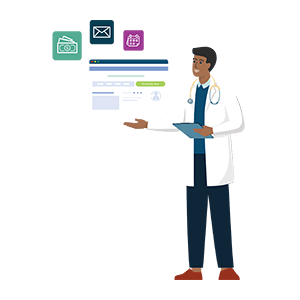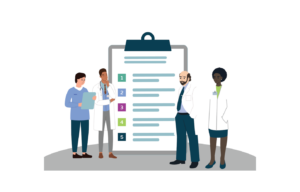Transform Your Cardiology Practice: 3 Signs Your Practice Could Be More Efficient

By Chloe From Clearwave | February 14, 2023
Increasing efficiency is key to transforming your cardiology practice and increasing revenue. Today making this transformation often demands a balance between staff work and technology solutions. Considering, labor costs are up 30% year-over-year, to maximize the value of full-time employees (FTEs), high-growth practices are leaning into technology solutions. Cardiology practices are automating tedious tasks and prioritizing staff time on higher-value tasks and patient care. By leveraging technology to automate staff workloads, cardiology practices only hope to improve both practice efficiency and also staff retention and satisfaction.
An advanced patient engagement platform can help transform your cardiology practice by automating many tasks that are time-consuming or burdensome for your staff, and even help improve some of the current issues your practice may be facing. Evaluate your efficiency by considering if these three signs are present at your cardilology practice.
1. Struggling to Scale Realized Revenue at Your Cardiology Practice
According to the Review of Ophthalmology, there is a provider shortage across specialties, however no shortage of patients needing care. The Review of Ophthalmology states, “One of the many challenges starting to impact ophthalmologists in America (as well as many other medical professionals) is a steadily increasing supply of patients needing care, with a dwindling supply of surgically trained doctors able to care for them.”
Furthermore, 90% of medical practices reported costs have risen faster than revenues in 2022. Even with an influx of cardiology patients, realized revenue is often dependent on your approach to collecting point-of-service revenue prior to rendering care, and correctly processing claims after the patient visit. If your staff are struggling to ask for POS collections or overdue balances at check-in, or are too busy to ask due to long lines, lean into technology to bridge the gap.
Automate registration with self-service check-in. Self-service patient check-in on a tablet, kiosk or smartphone can mitigate wait times and significantly improve POS collections. There are hidden revenue benefits you can unlock, simply by having patients check in themselves. With digital solutions you can customize patient-led registration workflows to always ask for payment, creating a more efficient process to collect point-of-service payments. At the same time, by enabling cardiology patients to register themselves, you can minimize the human error that comes with data collection, which makes claims processing more efficient on the back end of your cardiology practice’s revenue cycle.
You also may want to consider using a digital estimations strategy to increase self-pay collections. Digital solutions can help your cardiology practice automatically determine accurate patient estimations, provide financial transparency to patients and ask for patient responsibility at check-in. See the approach one practice used to streamline estimations, increase revenue and transform your cardiology practice.
2. Phone Calls Are Consuming Staff Time
Employees are spending too much time fielding phone calls to navigate missed appointments, rescheduling and cancellations. Time spent fielding calls is time your staff could have used to check in patients, have critical patient conversations or execute other daily tasks.
Consider how you could use automated technology to optimize your schedule and reduce manual burdens, like fielding calls to manage missed appointments, rescheduling and cancellations. Automating patient appointment reminders is one of the simplest tasks you can use to reduce staff time spent on the phone.
With an appointment reminder tool, patients will receive a call, email, or text reminding them of their appointment date and time. This tool can also help to reduce no-shows, removing the staff need to fill gaps or reschedule patients who’ve missed their appointment.
Even with reminders, your practice won’t be able to fully avoid last-minute cancellations and rescheduling. Further create efficiency for your cardiology practice with an automated waitlist tool.
With an automated waitlist, you can provide new and existing patients the option to get on the waitlist for specific appointment types and days of the week. Once an available appointment opens up, due to a cancellation or rescheduled appointment, the waitlist will automatically notify whoever is “NextUp” for that time and appointment type and fill in your scheduling gaps. With smart scheduling logic and strong PMS/EHR integrations, you can improve schedule efficiency – all without staff having to call on patients or even lift a finger. A waitlist can also help to provide convenience for patients who want to be seen as soon as possible, even when you’re taking in a higher number of patients. See how your busy cardiology practice could benefit from a waitlist.
3. Wait Times Are Impacting Patient Throughput and Satisfaction
Your waiting room is full, patients are spending more time waiting than with the doctor, and staff and physicians are staying late to see the full day’s appointments. Recent reports show that 2 out of every 5 patients are frustrated with their doctor before their visit, due to long in-office wait times. Besides being one of the biggest complaints made by patients, long patient wait times can impact point-to-service collections, schedule efficiency and the overall practice atmosphere (for staff, patients and providers.)
Reduce long lines and improve cardiology practice efficiency by enabling your patients to check in themselves, either at the office or through pre-registration links sent prior to their arrival.
Patient pre-registration is an easy tool cardiology practices can implement to cut down on the time patients spend filling out information or conversing with staff at check-in. A national survey reflects that 49% of patients want the ability to check in or complete health forms before arriving. Self-check-in at the office via a phone, tablet, or kiosk can also speed up patient wait times, in some cases, practices saw a 90% decrease in wait times.
A comprehensive patient engagement platform can help improve patient wait time through pre-registration and unlock hidden growth potential.
Use Patient-led Registration to Transform Your Cardiology Practice
In a conversation on “How to Unlock Hidden Revenue During Patient Check-In”, Daniel Chattom, Clinical Systems Manager at Southview Medical Group, shares a registration strategy that resulted in shorter wait times and nearly immediate revenue results. If you need to improve in-office efficiency and revenue results, tune in to see what Southview Medical Group implemented to provide a top-line patient experience while increasing efficiency and collections.
Recommended for you
Related Posts
Calculate How Medical Insurance Verification Software Saves 500+ Staff Hours
Reading Time: 3 minutesBy Blakely Roth | April 16, 2025 Stretched thin in the billing or administrative department and looking for a way…
How FQHCs Improve Revenue Management With Patient Kiosks
Reading Time: 3 minutesBy Blakely Roth | April 9, 2025 East Jordan Family Health Center (EJFHC) is a Federally Qualified Health Center (FQHC)…
Patient Self-Scheduling Adoption Reaches New Heights at 87%
Reading Time: 3 minutesBeyond Utilization, Clearwave Data Unveils Features That Increase Patient Acquisition by 174% and Save 1,500 Staff Hours ATLANTA, April 2, 2025…




